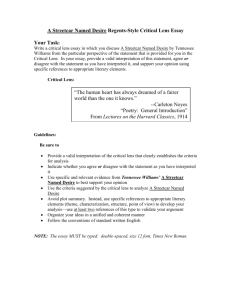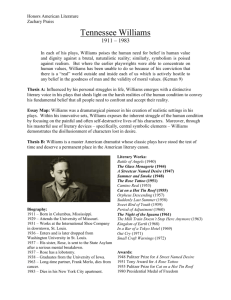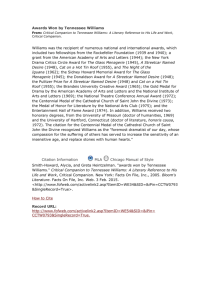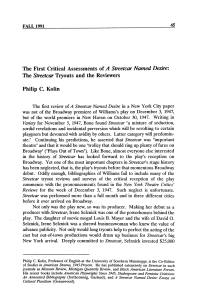Tennessee Williams
advertisement
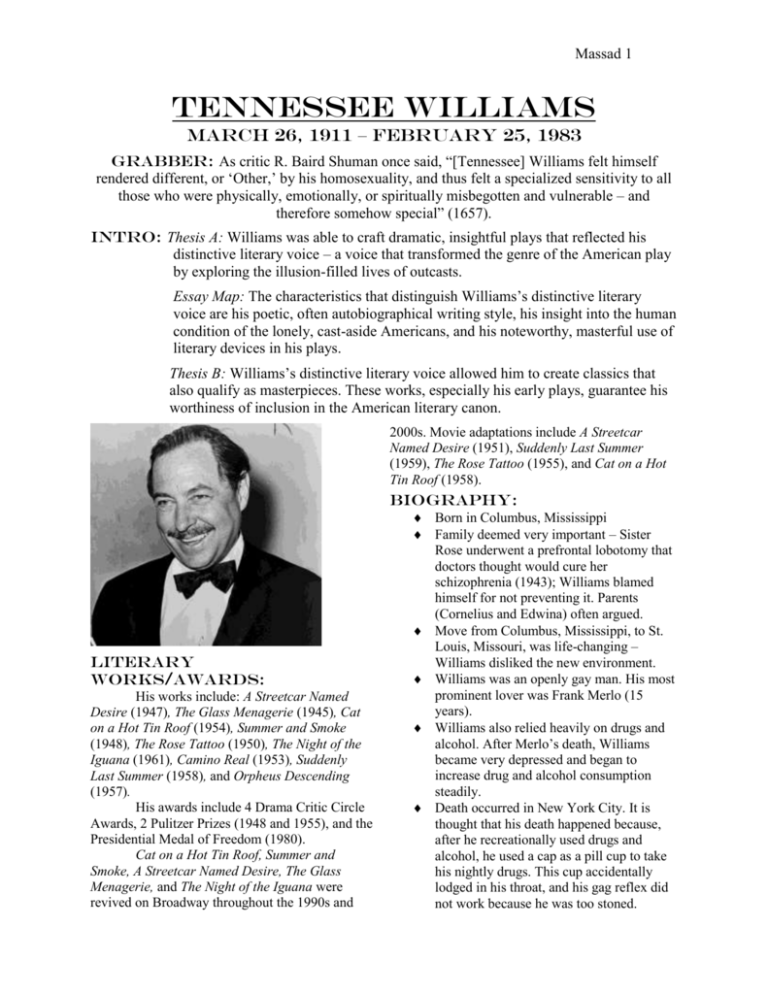
Massad 1 Tennessee Williams March 26, 1911 – February 25, 1983 Grabber: As critic R. Baird Shuman once said, “[Tennessee] Williams felt himself rendered different, or ‘Other,’ by his homosexuality, and thus felt a specialized sensitivity to all those who were physically, emotionally, or spiritually misbegotten and vulnerable – and therefore somehow special” (1657). Intro: Thesis A: Williams was able to craft dramatic, insightful plays that reflected his distinctive literary voice – a voice that transformed the genre of the American play by exploring the illusion-filled lives of outcasts. Essay Map: The characteristics that distinguish Williams’s distinctive literary voice are his poetic, often autobiographical writing style, his insight into the human condition of the lonely, cast-aside Americans, and his noteworthy, masterful use of literary devices in his plays. Thesis B: Williams’s distinctive literary voice allowed him to create classics that also qualify as masterpieces. These works, especially his early plays, guarantee his worthiness of inclusion in the American literary canon. 2000s. Movie adaptations include A Streetcar Named Desire (1951), Suddenly Last Summer (1959), The Rose Tattoo (1955), and Cat on a Hot Tin Roof (1958). Biography: Literary Works/Awards: His works include: A Streetcar Named Desire (1947), The Glass Menagerie (1945), Cat on a Hot Tin Roof (1954), Summer and Smoke (1948), The Rose Tattoo (1950), The Night of the Iguana (1961), Camino Real (1953), Suddenly Last Summer (1958), and Orpheus Descending (1957). His awards include 4 Drama Critic Circle Awards, 2 Pulitzer Prizes (1948 and 1955), and the Presidential Medal of Freedom (1980). Cat on a Hot Tin Roof, Summer and Smoke, A Streetcar Named Desire, The Glass Menagerie, and The Night of the Iguana were revived on Broadway throughout the 1990s and Born in Columbus, Mississippi Family deemed very important – Sister Rose underwent a prefrontal lobotomy that doctors thought would cure her schizophrenia (1943); Williams blamed himself for not preventing it. Parents (Cornelius and Edwina) often argued. Move from Columbus, Mississippi, to St. Louis, Missouri, was life-changing – Williams disliked the new environment. Williams was an openly gay man. His most prominent lover was Frank Merlo (15 years). Williams also relied heavily on drugs and alcohol. After Merlo’s death, Williams became very depressed and began to increase drug and alcohol consumption steadily. Death occurred in New York City. It is thought that his death happened because, after he recreationally used drugs and alcohol, he used a cap as a pill cup to take his nightly drugs. This cup accidentally lodged in his throat, and his gag reflex did not work because he was too stoned. Massad 2 His Distinctive features I. His Poetic, Autobiographical style A. Literary example: Williams’s use of language describing the scenery in the play demonstrates his poetic writing style, which contributes to the development of his distinctive writing style: “[A light goes on behind the blind, turning it light blue…. Two rooms can be seen, not too clearly defined]” (A Streetcar Named Desire 8). B. Critical Quote: Because, in this drama, Williams writes of destructive male-female relationships using a convincing voice, his work may be “sometimes too personal, too intimate, too incestuous, to be acceptable to the outside without embarrassment” (Brien 547). II. Masterful use of literary devices (symbolism and characterization) A. Literary Example: “What you are talking about is brutal desire – just – desire! – the name of that rattle-trap streetcar that bangs through the Quarter, up one old narrow street and down another” (A Streetcar Named Desire 81). B. Critical quote: “Sometimes, especially in his more recent plays, [Mr. Williams] begins to get tiresome, endlessly manhandling our pity: Brother, can you spare a tear? He has always been inclined to sentimentality. But in his best plays he earns for his characters the pity he demands, and what becomes astonishing is the lush richness and variety that he finds within the nutshell of his obsession” (Novick 548). III. Insight into the condition of the lonely, castaside Americans A. Critical Quote: “Williams’s most prominent and all-inclusive theme is an effect of an aggressively competitive society on sensitive characters…. all are social outcasts in society” (Ruzinko 2736). B. Literary Example: Blanche Dubois fulfills the role of outcast in this drama. She is blinded from life by her envisioned illusions. She wants to believe in the traditional, grandiose ways of the South that is now different: “I take it for granted that you still have sufficient memory of Belle Reve to find this place and these poker players impossible to live with” (A Streetcar Named Desire 80). C. Literary Example: “I don’t want realism. I want magic! Yes, yes, magic! I try to give that to people. I misrepresent things to them. I don’t tell truth, I tell what ought to be truth” (A Streetcar Named Desire 145). D. Literary Example: “You come in here and sprinkle the place with powder and spray perfume and cover the light-bulb with a paper lantern, and lo and behold the place has turned into Egypt and you are the Queen of the Nile!” (A Streetcar Named Desire 158). E. Critical quote: She is “unable to operate on the realistic level” (Novick 548). IV. Masterpiece Classic Canon-worthy A. “A classic is a book that is never finished saying what it has to say” (Calvino 128). “A classic is a book that comes before other classics; but anyone who has read the others first, and reads this one, instantly recognizes its place in the family tree” (Calvino 133). B. Bloom’s list: The Glass Menagerie, A Streetcar Named Desire, and Summer and Smoke. C. “Williams often makes a somewhat sentimental evaluation of the lost and the lonely, those who are isolated in some way” (Shuman 1656), those branded as “Other.”
